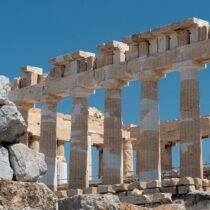To Start…
After the unprecedented rise of Greek medicine, one would have expected that in Rome, which had become the successor of Greece, it would continue to develop on an upward trajectory. However, this did not happen. For certain historical reasons, the decline of science, including medicine, rather began in Ancient Rome. During this era, although outstanding physicians appeared, they rather considered it their duty to serve the wealthy Romans, whose main requirement for treatment was that it should be as unburdensome and pleasant as possible. For the most part, the successes of Roman medicine were due to the work of Greek scholars, especially Hippocrates.
Medical Schools of Ancient Rome
The foundation of medical teaching in ancient Rome was based on knowledge derived from Greek medicine. In the first place the works of Hippocrates were used, containing descriptions of many diseases and methods of their treatment.
Medical schools in ancient Rome appeared in the era of the Republic. It was believed that the physician should have knowledge from a variety of disciplines. Some physicians were trained in military hospitals. By helping the wounded, they acquired new knowledge of anatomy and physiology.
Treatment methods and remedies
The treatment methods used combined medicinal therapy as well as various magical and religious rituals. Physicians knew the benefits of a healthy diet, exercise, daily regimen and fresh air.
Herbal medicine was very widespread in ancient Rome. It is believed that it was the basis of modern knowledge about medicinal plants. Herbs, minerals, and potions made from several different ingredients were used as remedies.
A catalog written by the military physician Dioscorides has come down to this day. It describes about 600 kinds of medicinal plants and nearly 1000 potions that he used to treat his patients. Another source of comprehensive information on medicinal plants was the books of Pliny.
Galen’s teachings
While Hippocrates was the most famous physician in ancient Greece, Claudius Galen was especially revered in Rome. He practiced medicine and science and left a large number of works devoted to pharmacology and therapeutic methods. He described 304 medicinal plants, 80 medicines of animal origin and 60 of mineral origin. He used them in the form of decoctions, infusions, powders, and other forms.
Unlike Hippocrates, Galen believed that medicinal plants, along with their beneficial effects, could have harmful effects. It was the medicinal properties that he tried to “extract” from them. Some of the medicinal preparations first described by him are still in use today.




